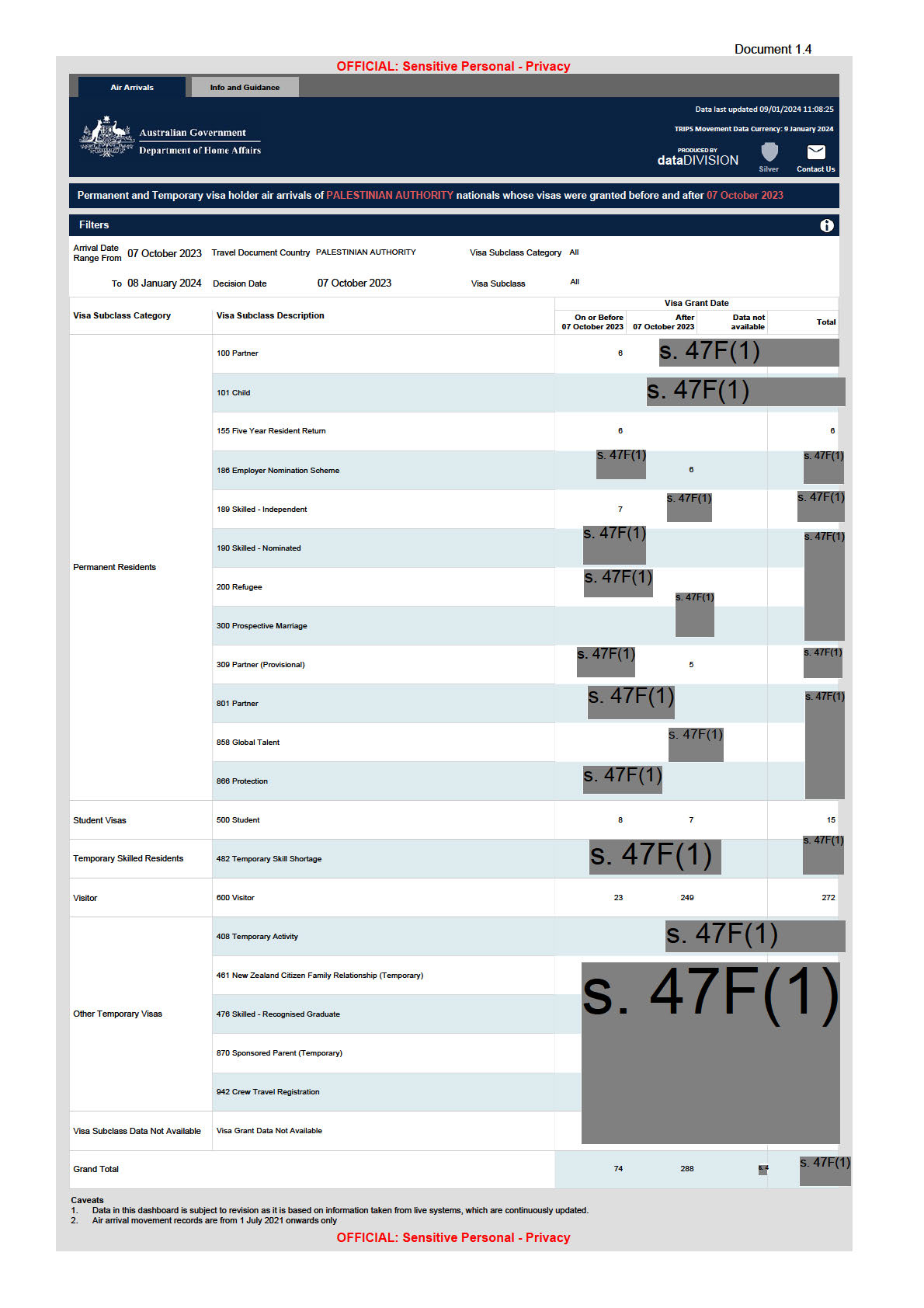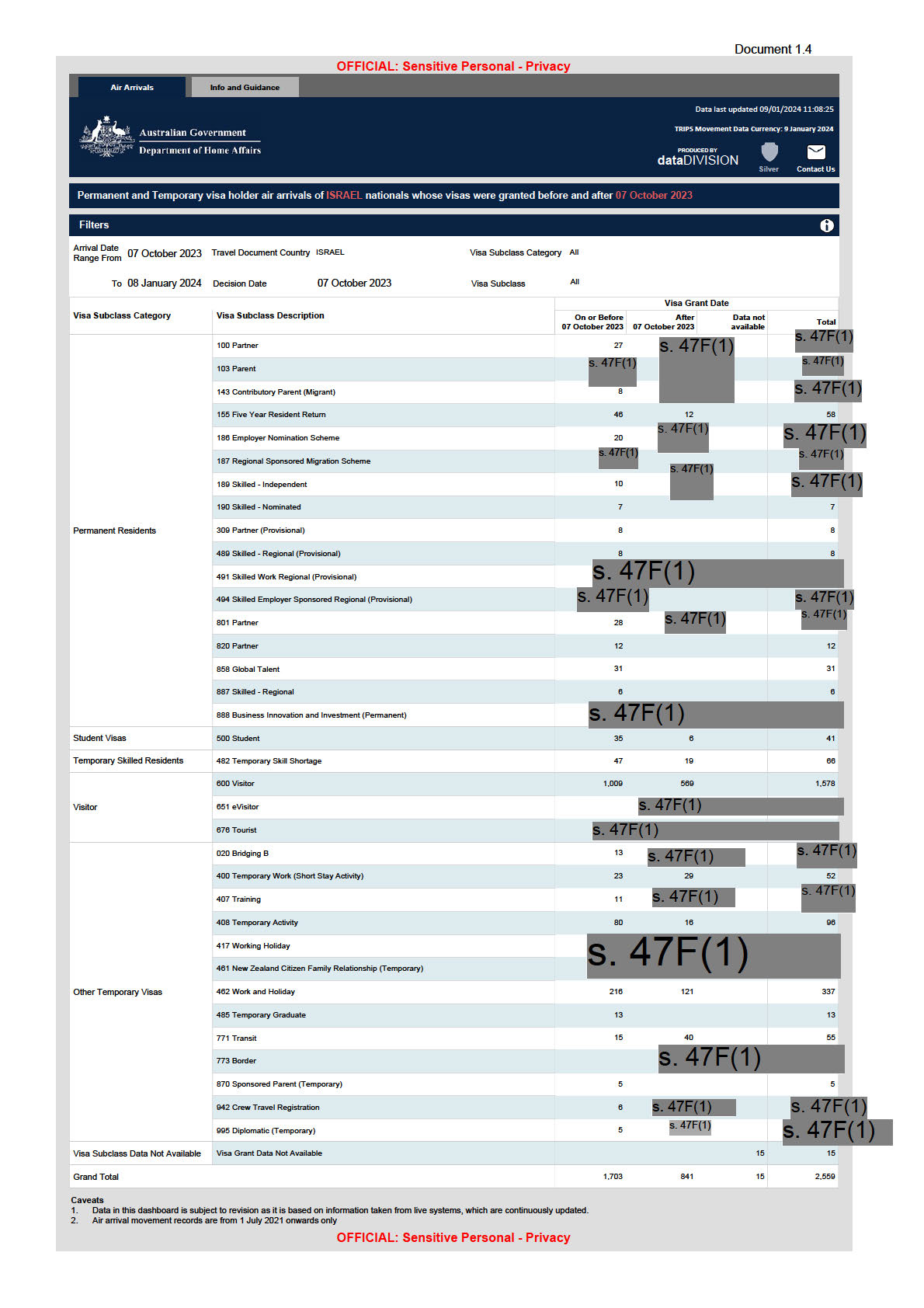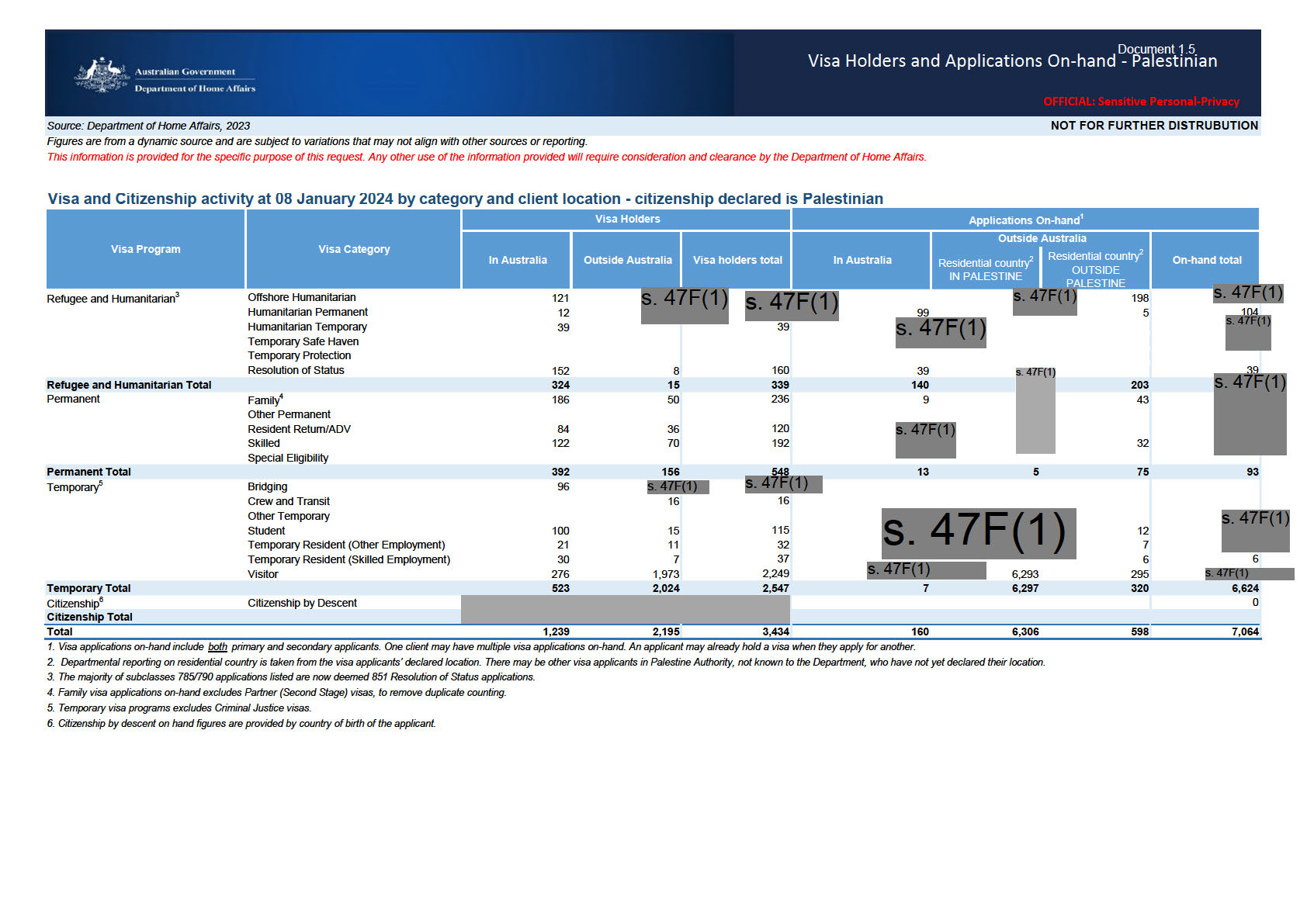
 PROTECTED
PROTECTED
Document 1
Submission
For decision
PDMS Ref. Number: MS24-000029
Date of Clearance: 12/01/2024
To
Minister for Immigration, Citizenship and Multicultural Affairs
Subject
Post-arrival support options for persons from Israel and the Occupied
Palestinian Territories affected by the Hamas-Israel conflict
Timing
For consideration by 17 January in order to progress proposed options, as agreed
with advisor S/ Advisor Matheson.
Recommendations
That you:
s. 34(3)
3.
Note that persons from Israel and the Occupied Palestinian
noted / please discuss
Territories on temporary visas may apply for further visas
onshore, providing they meet relevant eligibility
requirements.
4.
Agree to advise the Department that persons from
agreed / not agreed
significantly affected areas of Israel and the Occupied
Palestinian Territories whose temporary visas cease without
having made a further visa application give special
consideration to the granting of a Bridging E visa (BVE), with
work rights, for a maximum duration of 12 months through a
single visa grant.
PROTECTED
1
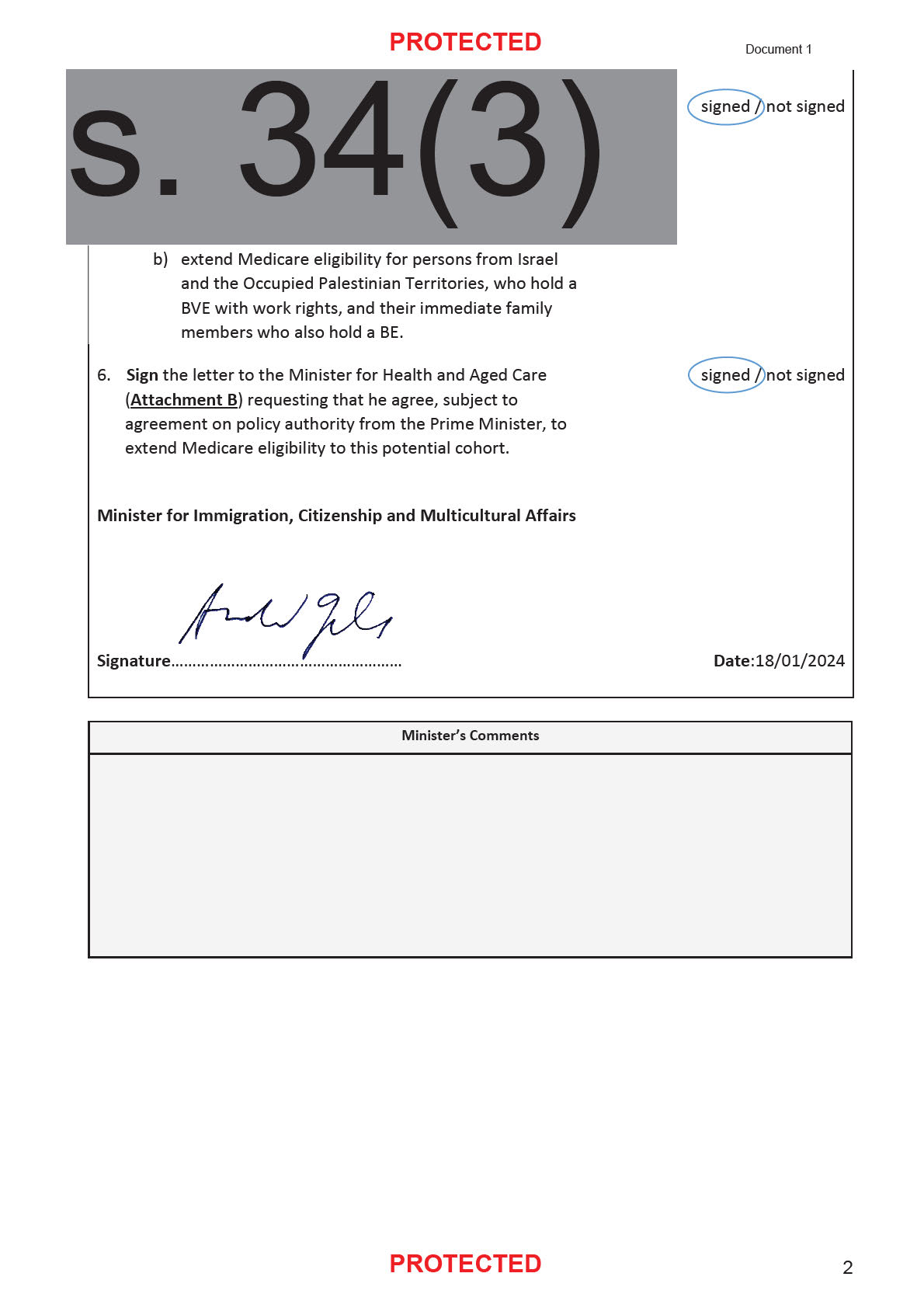

 PROTECTED
PROTECTED
Document 1
Key Issues
1. Your office has requested advice on options and mechanisms to provide post-arrival support
to persons from Israel and the Occupied Palestinian Territories impacted affected by the
Hamas-Israel conflict.
s. 34(3)
Further visa pathways for persons from Israel and the Occupied Palestinian Territories
7. Persons from Israel and the Occupied Palestinian Territories wishing to extend their stay in
Australia may apply for another visa before their initial visa ceases, which could include
family, skilled, or student visas depending on their circumstances (see
Attachment C). While
awaiting the outcome of their application, in most circumstances a Bridging A (subclass 010)
visa (BVA) would come into effect, the conditions of which will vary depending on the type of
substantive visa applied for, and the circumstances of the applicant. Where financial hardship
PROTECTED
3
 PROTECTED
PROTECTED
Document 1
is demonstrated, the BVA grant may include work rights. Only BVAs granted in association
with a permanent visa will enable enrolment in Medicare, subject to meeting other
requirements (having work rights on their visa or a parent, spouse or child who is an
Australian citizen, Australian permanent resident or eligible New Zealand citizen).
8. Those who may fear harm if they were to return to Israel or the Occupied Palestinian
Territories can apply for a Protection (subclass 866) visa which, if granted, lets the holder stay
in Australia indefinitely. Persons who apply while they hold a substantive visa are eligible to
be granted a BVA, which may include seeking work rights and consequential eligibility to enrol
in Medicare (as per above).
9. Consistent with the direction from your office, Temporary Humanitarian Stay options (such as
those provided to Afghans and Ukrainians in recent years) are not currently being considered.
Options for a Bridging visa E (BVE) safety net (work rights and Medicare eligibility)
10. Individuals who become unlawful following the cessation of their substantive visa will be
eligible for a Bridging E (subclass 050) visa (BVE). A BVE is a short-term bridging visa that
allows eligible individuals to stay in Australia lawfully while they seek to resolve their
immigration status by obtaining a substantive visa or while they make arrangements to
depart.
11. A BVE may be granted where an individual is making arrangements to leave Australia, or in
association with an ongoing immigration process (while they await the outcome of a
substantive visa application or subsequent merits or judicial review). Persons from Israel or
the Occupied Palestinian Territories who meet the requirements for a BVE may remain in
Australia as the holder of a BVE until the situation stemming from the Hamas-Israel conflict
stabilises and they can return home, or, where relevant, until the outcome of any application
they might make for a substantive visa (where they are not granted another type of Bridging
visa in association with that application).
12. A BVE on departure grounds would general y be granted for a short period while a non-citizen
engages with making departure arrangements. However, BVEs have previously been granted
for longer durations in response to global events, including for non-citizens affected by border
closures during the COVID-19 pandemic (up to six months), and for Ukrainian nationals who
did not accept the offer of a Temporary Humanitarian Stay before the specified deadline of
31 July 2022, but who were unable to return home due to the Ukraine crisis (up to
12 months).
13. We recommend you specify, as a matter of policy, that a delegate should give special
consideration to the grant of a BVE for a maximum duration of 12 months to persons from
significantly affected areas of Israel and the Occupied Palestinian Territories who are eligible
non-citizens. Should you agree, the Department will communicate this policy to delegates. A
BVE will cease if the holder departs Australia.
Work rights
14. Where a BVE is granted on departure grounds a number of conditions are discretionary,
including work rights. The Department recommends giving special consideration to the
provision of work rights to BVE holders from areas of Israel and the Occupied Palestinian
Territories significantly affected by the Hamas-Israel conflict. This proposed policy is with the
PROTECTED
4
 PROTECTED
PROTECTED
Document 1
intent of ensuring individuals who may not be able to return home can support themselves
financially in Australia in the interim.
15. Given current circumstances, the Department proposes that by policy all persons from the
Occupied Palestinian Territories, as well as persons from significantly affected areas of Israel
(in consideration of advice of the Department of Foreign Affairs and Trade) be provided work
rights on their BVEs, subject to review when required.
Health care support
16. BVE holders who arrive lawfully by air are not ordinarily eligible for Medicare. As with the
Ukrainian cohort of BVE holders, subject to relevant policy approvals, eligibility for Medicare
can be extended to BVE holders with work rights, and their families, from significantly
affected areas of Israel and the Occupied Palestinian Territories through a delegated
Ministerial Order under the
Health Insurance Act 1973, administered by the Department of
Health and Aged Care. While difficult to project, it is expected that there will not be significant
numbers of BVE holders with work rights from Israel and the Occupied Palestinian Territories.
By comparison, despite approximately 4,000 visitor visas being granted to Ukrainians since
August 2022, there have only been 75 BVEs granted to Ukrainians over that same period.
17. When agreeing to pursue Medicare eligibility for Ukrainians on BVEs, you also agreed to
extend this decision to non-Ukrainian family members on BVEs in Australia (
MS22-001555 refers), and the relevant ministerial order providing eligibility for Medicare to Ukrainians on
BVEs also encompassed any of their children born in Australia who were granted BVEs due to
operation of law under Section 78 of the
Migration Act 1958. The Department recommends
this arrangement be replicated for relevant family members of persons from Israel and the
Occupied Palestinian Territories who hold a BVE with work rights, regardless of whether those
family members also have work rights on their BVE.
18. The letter to the Prime Minister at
Attachment A seeks his approval to extend Medicare
access to this prospective cohort, and a letter to the Minister for Health and Aged Care has
also been prepared for your signature (
Attachment B) seeking that the relevant order be
made (subject to the Prime Minister’s agreement). The letter to the Prime Minister proposes
that financial implications of this proposal be settled with the Department of Finance as part
of the 2024-25 Budget process.
Background
s. 34(3)
PROTECTED
5
 PROTECTED
PROTECTED
Document 1
s. 34(3)
20. From 7 October 2023 to 8 January 2024, a total of 9,065 visa applications were lodged by
people declaring Palestinian citizenship, while 8,952 of these were Visitor visa applications
lodged by people outside of Australia. During this time, the Department granted 2,314 visas
to people declaring Palestinian citizenship, including 2,162 visitor visas (1,904 of these were
granted to people outside Australia).
Consultation – internal/external
21. Internal: Visa Support Centre; Finance Division, Procurement, Property and Contracts Division,
Disputes and Corporate Law Division; Immigration Policy Division; Immigration Compliance
Division; Visa Support Centre; Compliance and Community Protection Policy Branch;
Multicultural Affairs Branch; Israel-Hamas Social Cohesion Taskforce
22. External: the Department of the Prime Minister and Cabinet; the Department of Foreign
Affairs and Trade; the Department of Finance; the Department of Health and Aged Care;
Services Australia.
Consultation – Secretary / A/g Dep Sec Immigration / ABF Commissioner (Mandatory Field)
23. The A/g Secretary was not consulted on this submission.
24. A/g Deputy Secretary Immigration was consulted on the approach in the submission.
25. The ABF Commissioner was not consulted on the approach in the submission.
Client service implications
26. The Department has published a web form and web content specific to the situation relating
to the Hamas-Israel conflict. The web form provides a channel through which impacted
people may contact the Department directly.
27. Talking points, community messaging and messaging for client enquiries is essential to
managing the caseload. These continue to be refined through standard channels.
Risks and Sensitivities
28. By providing work rights and Medicare access for BVE holders, there is a risk that the
Government could be perceived to be encouraging individuals to become unlawful, noting
individuals would need to become unlawful following the cessation of their current visa
before being eligible for the grant of a BVE. This also means that arrivals on a temporary visa
without work rights / Medicare (such as a Visitor visas) will remain without these privileges
until their temporary visa ceases. Pending the establishment of necessary arrangements, the
proposed emergency relief support may assist such cases.
29. As noted above, given the low uptake of Ukrainians on BVEs (even with the provision of
Medicare eligibility), there may be a similarly low uptake for persons from Israel and the
Occupied Palestinian Territories. However, the provision of Medicare eligibility for BVE
holders with work rights would provide a safety net for those without access to another visa
PROTECTED
6
 PROTECTED
PROTECTED
Document 1
and who are by the Hamas-Israel conflict. It is also possible that the BVE take-up might be
greater for the potential caseload from the Occupied Palestinian Territories than for
Ukrainians, noting their financial circumstances may impact on their capacity to meet relevant
Visa Application Charges associated with other visa options (such as family, skilled and
student visas).
30. Provision of emergency relief, and BVE Medicare access and work rights for BVE holders, may
spark criticism from other multicultural communities in Australia who have not received
similar support where crises have taken place in their countries of origin (for example, the
Sudanese community). It may also set a precedent that Australia should respond in this way in
similar circumstances in other countries in the future. This could come at a significant cost
given the large volume of potentially impacted people should the current Hamas-Israel
conflict spread further into Lebanon or elsewhere in the Middle East.
s. 34(3)
Financial/systems/legal/deregulation/media implications
s. 47C(1)
s. 42(1)
PROTECTED
7
 PROTECTED
PROTECTED
Document 1
s. 42(1)
Attachments
Attachment A
Letter to the Prime Minister
Attachment B Letter to the Minister for Health and Aged Care
Attachment C
Background on visa grants and arrivals in Australia of persons with declared
Palestinian and Israeli citizenship and movements out of the Occupied
Palestinian Territories
Attachment D Air Arrivals - Palestinian Authority and Israel
Attachment E
Visa Holders and applications on-hand – citizenship declared as Palestinian or
Israel
Authorising Officer
Cleared by:
Andrew Kiley
First Assistant Secretary
Refugee, Humanitarian and Settlement Division
Date: January 2024
Mob: s.22(1)(a)(ii)
Contact Officer (minimum SES Band 1) Andrew Kiley, FAS First Assistant Secretary Refugee, Humanitarian and
Settlement Division Ph:s.22(1)(a)(ii)
Through
Chief Finance Officer
CC
Secretary
A/g DS Immigration
DS Chief Operating Officer
DS Executive
DS National Security and Resilience
Group Manager Legal
Chief Finance Officer
FAS Immigration Policy
FAS Executive Coordination
FAS Citizenship and Multicultural Affairs
PROTECTED
8
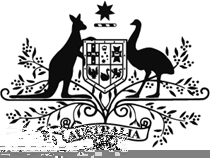
 PROTECTED: CABINET
PROTECTED: CABINET
Document 1.1
s. 34(3)
PROTECTED: CABINET
 PROTECTED: CABINET
PROTECTED: CABINET
Document 1.1
2
s. 34(3)
PROTECTED: CABINET
 PROTECTED: CABINET
PROTECTED: CABINET
Document 1.1
3
s. 34(3)
PROTECTED: CABINET
 PROTECTED: CABINET
PROTECTED: CABINET
Document 1.1
4
s. 34(3)
PROTECTED: CABINET
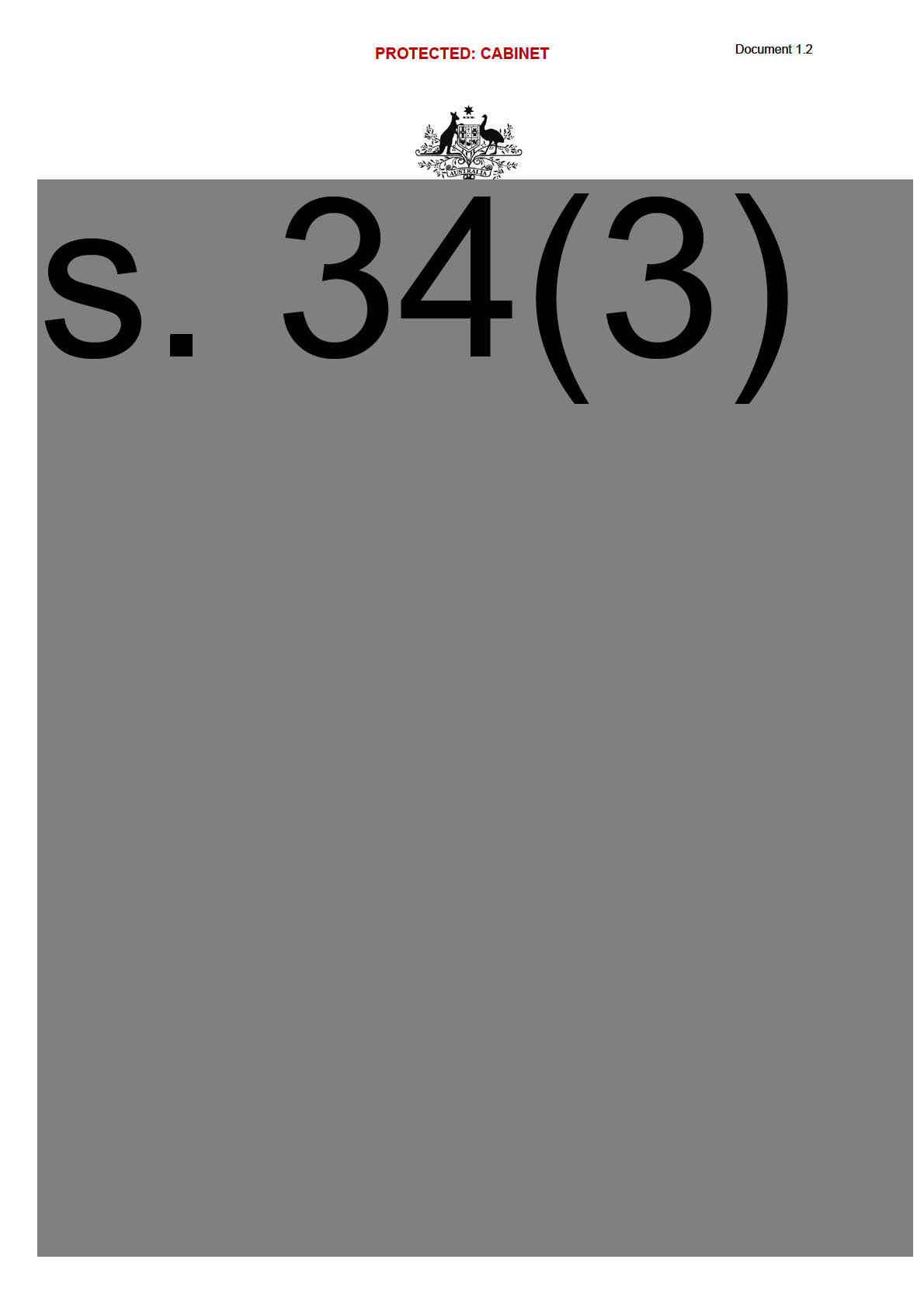

 PROTECTED: CABINET
PROTECTED: CABINET
Document 1.2
2
s. 34(3)
PROTECTED: CABINET

Document 1.3
Attachment C - Background on visa grants and arrivals in Australia of persons with
declared Palestinian and Israeli citizenship and movements out of the Occupied
Palestinian Territories
Palestinian and Israeli visitor visa holders
363 persons with a declared Palestinian citizenship have arrived in Australia since the start
of the current Hamas-Israel conflict to 8 January 2024, the majority of whom have arrived
on a Visitor (Subclass 600) visa (272 individuals, or 75 per cent). Most Visitor visas have been
granted with a 12 month validity and three-month stay. Of the arrivals in this period,
57 held a permanent or provisional visa.
2,559 persons with an Israeli travel document have arrived in Australia since the start of the
current Hamas-Israel conflict to 8 January 2024, the majority of whom have arrived on a
Visitor visa (1,581 individuals, or 62 per cent). Most Visitor visas have been granted with a
12 month validity and three-month stay. Of the arrivals in this period, 246 held a permanent
or provisional visa.
As at 8 January 2024, there were 276 Visitor visa holders in Australia with a declared
Palestinian citizenship, and 638 Israeli Visitor visa holders in Australia (including some who
arrived prior to the current conflict), noting the number of Visitor visa holders in Australia
changes as holders arrive, depart or move onto other visa types.
Further data on visa grants and arrivals to Australia for persons from Israel and the
Occupied Palestinian Territories are at
Attachments D and E.
Movements out of the Occupied Palestinian Territories
While 2,136 Visitor visas have been granted to Palestinians since the start of the current
Hamas-Israel conflict, meeting the requirements for an Australian visa does not mean a
person will be able to depart. Exiting the Occupied Palestinian Territories is extremely
difficult and the ability of the Australian Government to help is limited. The Gaza border is
control ed by authorities who assess requests to assist foreign nationals and immediate
family members, and who have put tight limits on who can cross. The Department of
Foreign Affairs and Trade (DFAT) must work within the capacity of the system established
for foreign nationals seeking to leave, and is prioritising assistance to Australian citizens,
permanent residents and their immediate family.
The number of visa lodgements from Palestinians is now dropping, and there are only very
limited numbers of visa applications on hand which are likely to meet our policy and
legislative criteria for grant. Combined with the difficulties in exiting Gaza and the West
Bank, we are not likely to see further significant arrivals from the Occupied Palestinian
Territories to Australia, barring unforeseen developments. The Department is providing
daily visa statistics and will brief you should circumstances around this significantly change.
